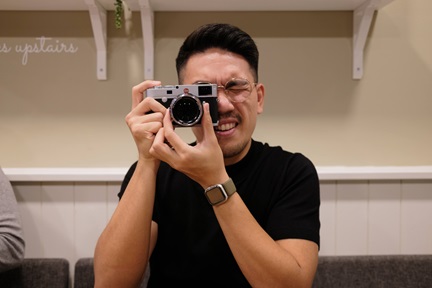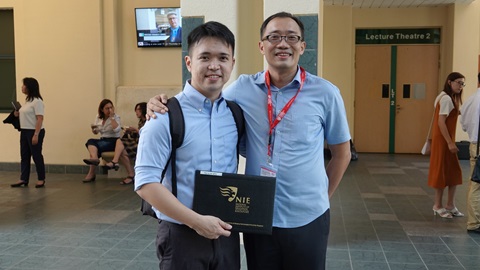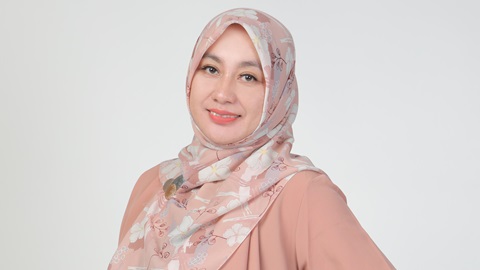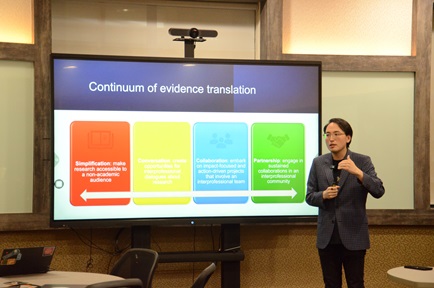Gen Zen: Feeling troubled? A confidential, non-judgemental listening ear is just a call away
Increasingly, people are becoming aware of the importance of mental health and well-being in our lives. In our weekly Gen Zen series, TODAY looks at ways that we can feel better while coping with the mental stresses of modern life.
- Helplines offer a confidential, non-judgemental space for people to seek mental heath support from trained staff who provide a listening ear
- Youthline, a helpline dedicated to youths up to the age of 35, receives around 300 calls in a week
- People behind helplines said that young people often reach out to discuss topics such as relationship issues
- While asking for help may be difficult, volunteers say that tapping the "abundant resources" available and one's social support system is important to protect mental well-being
SINGAPORE — Helpline volunteer Aisyah Abu Bakar recalled speaking to someone who had sought help on Youthline's chatline, but he was giving monosyllabic responses to her questions.
So she asked: "What are some songs that best describe your current situation?" That broke the ice, as the caller became more responsive and gave a long list of songs he loved.
Noticing the common themes of heartbreak and pain in the songs the caller shared, she then asked if the music reflected what he was feeling at the moment, which opened up the conversation into discussing why he was seeking help.
This is but one of the text conversations that Ms Aisyah has had with young people who seek help through Youthline’s WhatsApp chat line. The 24-year-old is visually impaired so she uses "text-to-voice" assistive technology, which converts text into spoken words.
Another volunteer at Youthline is Mr Kevin Wong, who is 32 years old this year and studying for a master’s degree in counselling and guidance at the National Institute of Education. He takes calls from the helpline and provides pro bono in-person counselling.
Both Ms Aisyah and Mr Wong have been surprised by the depths of struggle and isolation that some of their clients have faced.
This is even though the issues that young people tend to share over the conversations – often ranging from anxiety over studies or work to family issues – may be personally relatable to the volunteers.
“Some of the clients who come to the helpline, they face really intense issues that need sorting out. But they lack the support around them,” Ms Aisyah said.
Agreeing, Mr Wong said that he has spoken to clients who have endured complex experiences of clinical depression and grief, even at a young age.
Youthline is a registered charity founded last year that provides mental health services to young persons. It also runs the first youth-dedicated live helpline for anyone up to 35 years old.
It now supports up to 300 callers a week, with calls ranging from as short as 10 minutes to as long as five hours.
Another helpline that caters to a general public, Touchline by Touch Community Services, receives an average of about 100 calls a month. Around 30 out of a total of 320 calls for the last three months were from young persons.
TODAY spoke to the people behind helplines that provide mental help support for the youth, to understand what is involved in such calls and what kind of support they provide for those in need.
STARTING A CONVERSATION
Even though starting a conversation about one's mental health with a stranger may seem daunting, the helpline volunteers told TODAY that the caller sets the pace and tone of the conversation. Helpline officers are trained to convey empathy and not to judge the caller.
For first-time callers, Mr Wong assures them that whatever is shared will be kept confidential and there is no pressure for callers to reveal their name.
Over the WhatsApp chatline, a helpline care officer will attend to a chat within 30 seconds, unless there is a high volume.
Ms Aisyah said that she lets conversations take its natural course and tries to look at issues through the other person's point of view in a non-judgemental manner.
For those who may have a harder time opening up, she typically starts discussing a more general topic, such as asking if they have had lunch or what interests they might have.
“This helps in bridging the human connection and trust between the texter and helpline care officer before delving into their issues,” she added.
Helpline care officers then gauge what support the individual needs, because some might simply need an outlet to vent their feelings, while others need a partner to brainstorm ways to approach a certain situation.
WHY YOUTH CALL FOR HELP
The non-judgemental and confidential space offered by a helpline can support youth who may need a listening ear on issues affecting their mental health.
Ms Andrea Chan, head of Touch Mental Wellness at Touch Community Services, said: “We also receive calls from young adults who are finding out if what they are facing is normal. Generally, there is a lack of knowledge and a sense of helplessness when they call for help.”
Agreeing, Ms Aisyah said: “Sometimes, people have this mindset that seeking help is a weakness, but it is a form of empowerment.
“I always have this idea that it is okay to not be okay. But it's not okay to remain not okay.”
Youthline said that one third of the texts and calls from youth tend to be regarding mental health conditions such as anxiety, depression, delusions or hallucinations.
Another third have psycho-social problems such as stress, concerns regarding self-esteem and self-worth, or a sleep disorder.
A third of their clients reach out regarding high-risk conditions such as suicidal thoughts, self-harm, sexual assault, bullying as well as relationship and family issues.
At Touchline, the youth tend to call to discuss challenges in school or relationship problems with a partner or family member.
“Over the years, the demands on youth have increased. Besides the usual familial, social and academic stress, they also need to juggle a digital identity and the complexity of being in a highly globalised world,” Ms Chan said.
THE POWER OF REACHING OUT
Taking the first step to reach out for help takes courage, but Ms Aisyah said that young people who do seek help can find access to “abundant resources” such as helplines and free counselling services.
A helpline can serve as a first point of contact, as a space for them to feel welcomed and assured that their concerns will be taken seriously and their feelings validated, while also being a way to link them up to relevant resources.
Ms Aisyah said: “If you really don't know what (resources) are meant for you, it's okay, you can just reach out and express what you need or what your issue is and you will get referred to somewhere that is much more helpful to your situation.”
Mr Wong said that helpline care officers are trained to support the caller to share more about the problem they are facing and to explore the resources and coping strategies or solutions they may have already tried.
They also help the individuals to explore other options or resources they can consider to address their problems.
Reaching out to one’s social system for support is key, Mr Wong said.
“Sometimes you're so caught up in your work, studies and life and you think, ‘Okay, never mind, I'm going to say no to meeting my friends, I'm going to say no to spending time with my mum and taking a walk in the Botanic Gardens… But sometimes, you have to say yes to these things, because these things are important and you get to spend time with family and friends, and be in nature.”
Ms Chan from Touch Community Services said that being willing to reach out for help and talk to a family member or friend who can provide support, or seeking professional help if the thoughts or challenges one is facing become unmanageable,is a key way to protect mental well-being.
“The path to mental wellness is not necessarily linear. Periods of high stressors may come our way, but one thing we can do is to band together and provide that support to each other,” she added.
People should also diversify their support system, Ms Aisyah said.
“The support system you are dependent on may get exhausted and burnt out, and sometimes may not be able to attend to you fully. So getting a wide range of support systems is important. Plus, it helps to have different perspectives,” she added.
Read the original article here.
Source: TODAYOnline © Mediacorp Pte Ltd. All rights reserved







